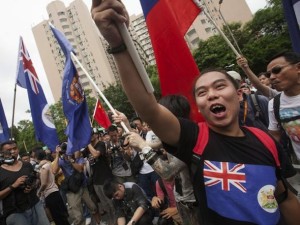Hong Kong’s civil liberties face attacks
USA Today
Zach Coleman, USA TODAY

HONG KONG — Hong Kong’s quirky status as a city under the authority of Communist China enjoying freedoms inherited from past British rule has long consoled democracy activists who take liberties here they wouldn’t dare exercise in mainland China.
But as many feared when the former British possession was turned over to China in 1997, the city has become less welcoming to dissenting voices.
Protesters from the Falun Gong religious group have for years displayed banners about atrocities against their brethren in mainland China, where authorities have jailed tens of thousands of group members. Their protests include demonstrations of mock organ harvesting that refugees say is being conducted on jailed Falun Gong members.
Recently, the group’s protests have been overwhelmed by demonstrators with placards from a newly formed organization taking China’s official line that the Falun Gong is an evil to be eradicated.
A schoolteacher who used foul language to upbraid police for failing to intervene in the harassment of Falun Gong demonstrators herself became a center of controversy. Thousands of people rallied to denounce her and were confronted by crowds voicing support for her action. The heated faceoff shut down a major shopping area.
Public forums demanding a fully elected government (the city’s leader and close to half of the legislators are chosen by select groups of business leaders and others favored by Beijing) have been a common sight for years. But now they are being disrupted by crowds of hecklers from yet another new organization.
Attackers have targeted the news publisher most associated with the pro-democracy movement; one attack involved the hijacking of a delivery truck at knifepoint and the incineration of its contents.
Worse, masked men beat anti-government demonstrators as police looked on outside a hall where C.Y. Leung, the current chief executive, was speaking last month.
“This is very worrying,” says Anson Chan, who served eight years as the No. 2 official in the city’s government under both British and Chinese rule. “No government should be seen to be aligned with unsavory elements. … The government should stand up and say, ‘We totally disown these sorts of activities,’ but the government has failed to do this.”
No one has directly linked the various gangs to China’s leadership, but local reports have tied one new anti-Falun Gong group to a Communist Party office in Shenzhen, China. And the Hong Kong government’s silence in the face of police actions, say Chan and others, has cast a shadow over a force that had been highly regarded for its professionalism.
“One of the things we take pride in is our squeaky-clean, impartial and fair-minded police force,” Chan says. “(But) there is a growing perception that the police (force) is biased and is not staying politically neutral.”
The souring environment is driving some to think of leaving or shifting savings overseas.
“More of my friends — professionals and businessmen — are telling me that they already have their papers to emigrate to Western nations like Australia and Canada,” university lecturer Bruce Lui told The Standard newspaper.
“They have grave worries about Hong Kong’s tense political environment. … I will also consider emigration,” he said.
Many expect the situation to only get worse. A new political movement has threatened to “occupy” the central business district of this financial center next summer if the government does not offer a suitably democratic plan for choosing the city’s next leader. Leung has already labeled Occupy Central illegal.
“Confrontation will be on the way,” says Sonny Lo, head of the social sciences department at the Hong Kong Institute of Education.
Lo warns that the Chinese army, which has kept a low profile within the confines of old British bases, could be called out into the streets. Unprecedented drills by squadrons of army helicopters and warships in Hong Kong’s harbor are making many people anxious.
“The atmosphere is pretty bad,” admits Allen Lee, who served in both Hong Kong’s and China’s legislatures. “I think Beijing does not know what to do.”
